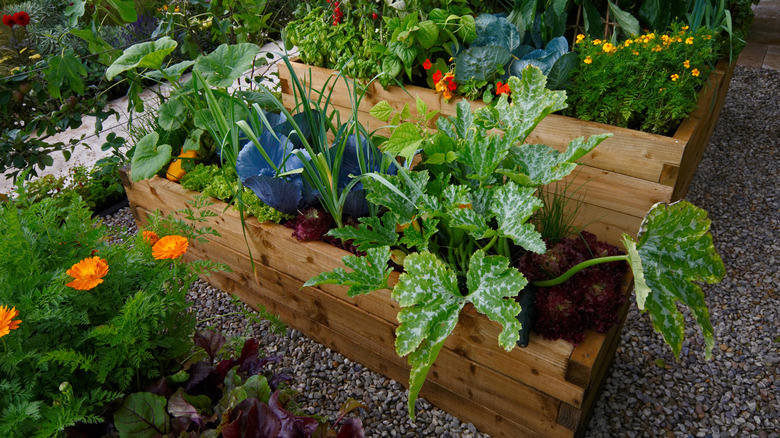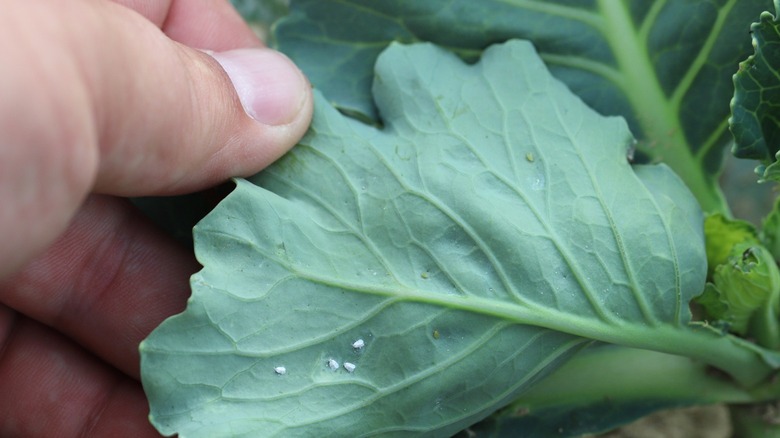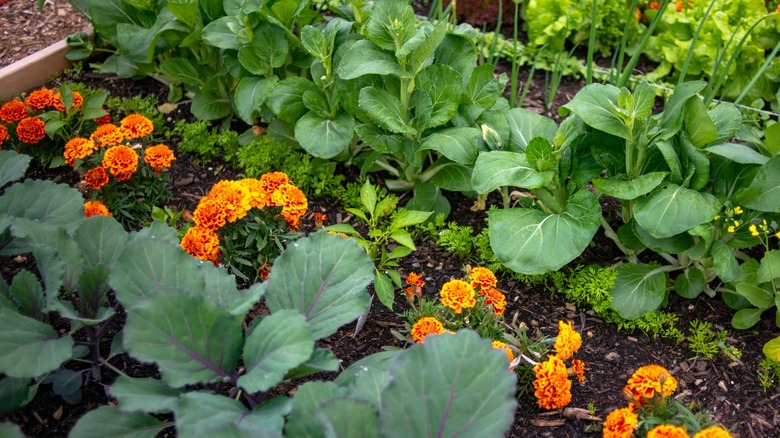The One Flower To Plant In Your Garden To Help Deter Pests
Growing your own food is one of the most rewarding experiences you can have, but it can also be a lot of work. Keeping pests at bay can be a huge challenge, especially if you're trying to grow organically. One of the secret weapons of organic gardeners is companion planting. This gardening strategy where you place certain plants near one another has many benefits, not the least of which is pest control. One flower that works for this purpose in the garden is the marigold (Tagetes), but successfully using this plant as a pest repellent can be tricky.
Not all marigolds will work, for one thing. French marigolds are the best, but they need to be the kind that has a strong smell. Another way marigolds work to control pests is as what's called a trap plant. Instead of companion planting, they're planted away from vulnerable plants to lure certain pests that plague them to their blooms instead. Marigolds can be beneficial because they deter certain pests while attracting others, protect certain plants, and can be easily added to most gardens.
What pests marigolds attract and deter and how it works
First of all, some of the pests marigolds help deter are whiteflies, blackflies, and aphids. They've even been proven effective against root-knot nematodes. Mosquitoes and wasps are also deterred by their strong scent, while African marigolds in particular are said to repel pests like spider mites. They're even believed by gardeners to be effective against squash bugs and tomato worms. Other than insects, this flower can keep deer and rabbits away from your garden as well. However, they attract slugs, snails, and thrips, so placing them away from other valuable edibles and plants can be beneficial.
Marigolds contain an essential oil that acts as a natural insect repellent called thiophene. Additionally, some pests like whiteflies are deterred by the limonene in marigolds. Another benefit of this flower is that it will attract valuable pollinators to your vegetable garden, making them a welcome addition. If you use marigolds as a trap plant for slugs and snails, be sure you visit them in the evenings to remove these pests by hand.
Tips on using marigolds for pest control
Some of the best companion plants for marigolds are strawberries, melons, other berries, and fruit trees. Vegetables include tomatoes, potatoes, squash, peppers, eggplant, and cucumbers, to name just a few. To add them to your garden, place them in tight clusters around the edges and also between vulnerable plants. French marigolds are superior, but African marigolds are also considered effective for above-ground pests. Luckily, these flowers are typically easy to care for, as long as you provide them with sufficient water at the base and enough sunlight.
The trick here is to think even farther ahead when using marigolds against root-knot nematodes. They ideally should be planted the year before you start growing the plants you want to protect. They produce a toxic chemical in their roots called alpha-terthienyl that fights the nematodes and prohibits their eggs from hatching. French marigolds are the most effective against them. Roses and tomatoes are particularly susceptible to nematodes and aphids, so plant marigolds close by for maximum protection.


